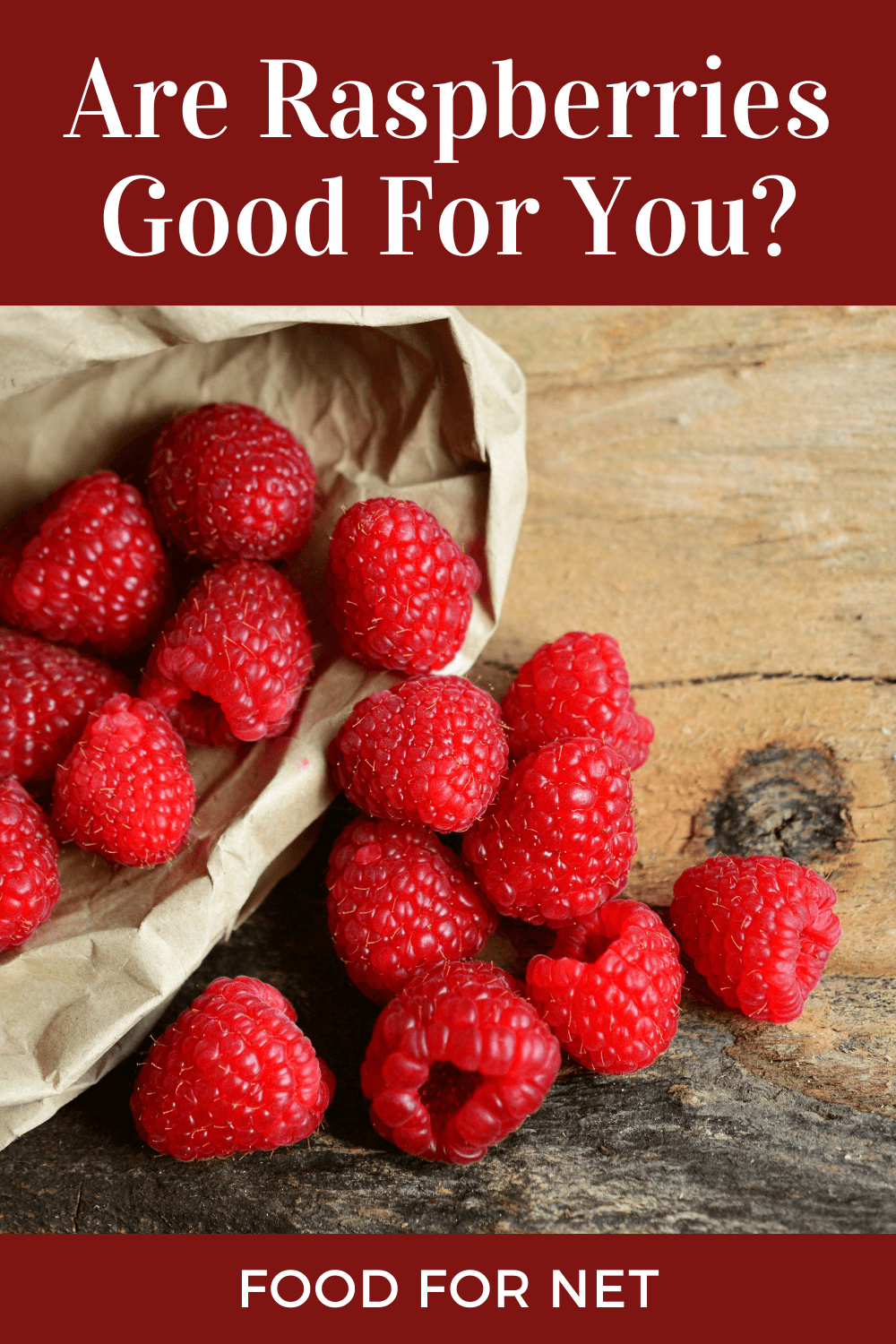
It’s easy to sing the praises of raspberries. The small fruit has a bright and vibrant flavor, one that makes any dessert taste that much better. Raspberries are also an easy smoothie addition or a delicious treat all on their own. So, what about the health side of things? It’s clear that raspberries are useful and delicious, but are raspberries good for you as well?
After all, raspberries rarely ever feature on superfood lists, so it’s easy to assume that they’re much less powerful than options like blueberries, cranberries, and pomegranates.
Don’t let that oversight fool you however, as the superfood label doesn’t mean all that much. Many of the healthiest fruits and vegetables aren’t the most famous ones. As it turns out, raspberries are much more powerful than we often assume.
Are Raspberries Good For You?
- Raspberry Nutrition
- Benefits Of Raspberries
- How Raspberries Could Be Harmful
- Are Freeze Dried Raspberries Healthy?
- Are Frozen Raspberries Healthy?
- Are Blueberries Better Than Raspberries?
- What About Yellow Raspberries And Black Raspberries?
- Final Thoughts
Raspberry Nutrition
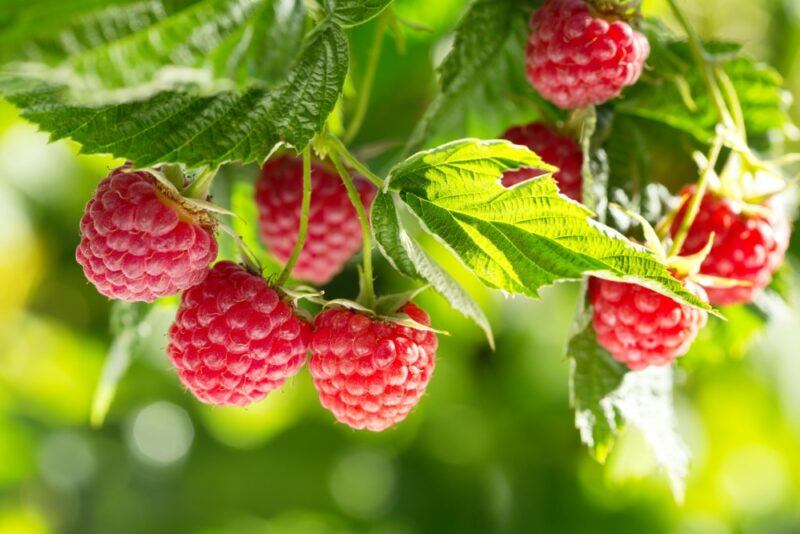
The nutrient profile is always the best place to begin. For raspberries, the first stand-out feature is the calorie content. You’re only getting around 64 calories in a cup. That’s not very much at all.
That same serving size also provides:
- Carbs: 15 grams
- Fiber: 8 grams
- Sugars: 5.4 grams
- Protein: 1.5 grams
- Vitamin C: 54% of your daily intake
- Manganese: 41% of your daily intake
- Vitamin K: 12% of your daily intake
- Folate: 6% of your daily intake
There are small amounts of other nutrients as well. Each of the vitamins and minerals can influence your health in a variety of ways, helping your body to function as it should and decreasing your risk of disease.
At first glance, the sugar might seem like an issue, but honestly, 5.4 grams of sugar in a cup of raspberries isn’t too bad at all. Most fruit contains more sugar than this – and remember, you do need some fruit in your diet, as it offers plant-based compounds that are critical for your health.
Benefits Of Raspberries

They’re A Keto Friendly Fruit
Let’s begin with an interesting fact – that raspberries are often eaten by keto dieters. Many types of fruit need to be avoided on a keto diet, due to their sugar content. Raspberries, however, are relatively low in sugar and contain a considerable amount of fiber.
The flavor of raspberries is helpful too, as you don’t need many raspberries to brighten up your dish. Even a few raspberries might do the trick, which helps to keep your sugar intake low.
These patterns aren’t just relevant to keto either. Any low carb or low sugar diet could easily include raspberries as an ingredient.
Being able to use them is important, as fruit contains many powerful plant based compounds, including antioxidants. Missing out on these entirely because you’re worried about sugar isn’t a good plan at all.
Their Fiber Content
Raspberries also happen to be an exceptional choice for fiber, giving you roughly 8 grams of fiber per cup of the berries. Few other fruits come close.
The fiber isn’t so surprising, as raspberries contain many small seeds.
Fiber is incredibly important and most of us need to be eating more of it. After all, fiber is what makes our digestive system function well. Too little fiber can lead to poor digestion, irregular bowel movements, and even increase your risk for heart disease and diabetes.
They’re Rich In Antioxidants
While raspberries don’t contain as many antioxidants as blueberries, they do contain a decent amount. These antioxidants are important, as they’ve been linked to a wide variety of benefits, including decreased inflammation and less oxidative stress.
Those effects can influence your health in many ways. For example, diets rich in antioxidants are thought to decrease your risk of various chronic diseases, including heart disease and diabetes.
There’s even the chance that antioxidants fight some of the negative effects of aging.
May Help With Blood Sugar Levels
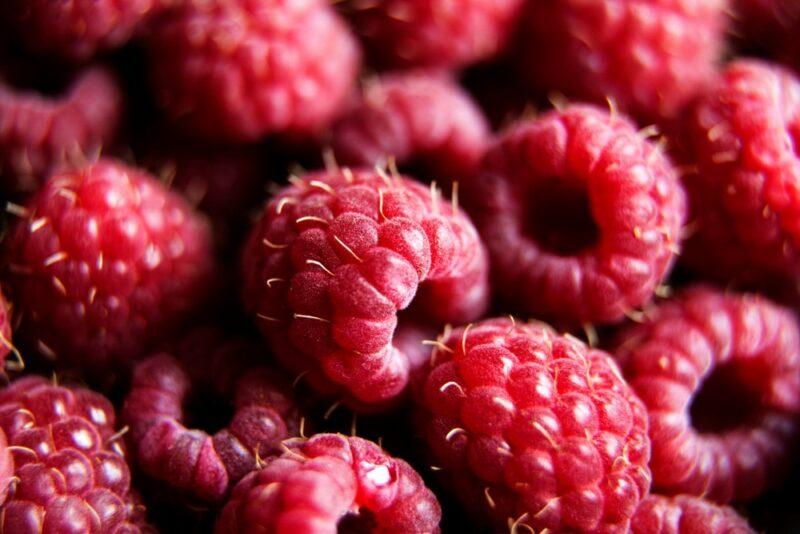
Raspberries contain a decent amount of fiber, along with tannins. This combination of features is excellent for blood sugar control, helping to decrease blood sugar spikes and keep blood sugar more stable.
The effect could be particularly important for anyone with diabetes. In fact, berries are often recommended as snacks for diabetics, with raspberries being one of the best options.
They Could Improve Your Health In Other Ways
Like other fruits, the combination of antioxidants, fiber, and nutrients in raspberries means that they may improve your health in a variety of different ways.
For example, the anti-inflammatory properties might lead to reduced joint pain for people with arthritis. Raspberries might help your skin too, due to their antioxidants and high vitamin C content.
Raspberries might even help with weight loss, as they’re low in calories and high in fiber. If nothing else, they’re certainly a healthier snack than a chocolate bar.
How Raspberries Could Be Harmful
Their Oxalate Content
One of the biggest problems with raspberries is easily missed – their oxalate content. Oxalates are natural compounds in food that can lead to kidney stones in some situations, particularly if you’re dehydrated.
Most of us can consume oxalates without too much problem, but anyone at risk of a kidney stone may need to be much more cautious. People in this situation might need to cut down to around 100 mg of oxalates per day or even 50 mg.
Doing so involves cutting out some oxalate rich foods entirely and keeping a close eye on portion sizes.
As for raspberries, you’re getting close to 50 mg from a single cup of the berries. That’s a lot, especially as you’ll get oxalates from other foods as well. Having a cup of the berries might be out of the question, but having a few on a low oxalate diet can still work well.
Side Effects From The Fiber
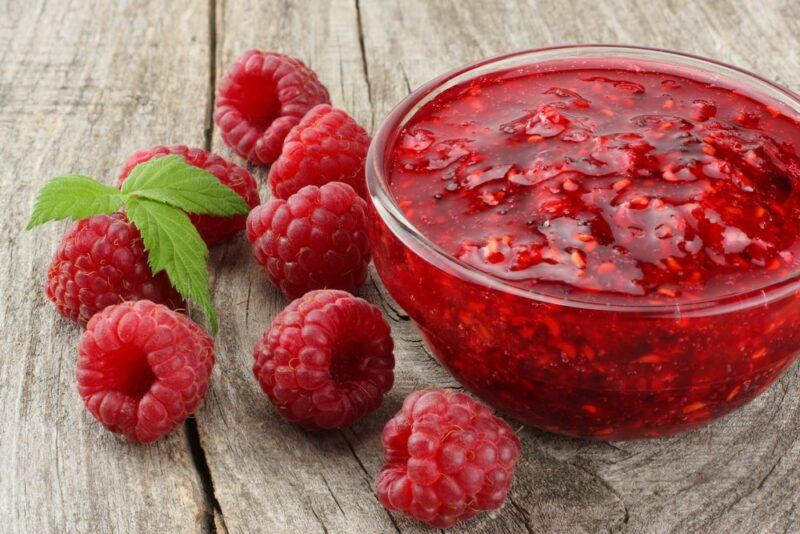
The high fiber content of raspberries is mostly a good thing. You do need this fiber to keep your digestion ticking along and to help stabilize your blood sugar levels. However, there are some important things to highlight.
First, you might experience some side effects. Fiber-related side effects are common if you notably increase your fiber intake. Having a few handfuls of raspberries, for example, might be enough to give you a stomachache, especially if you don’t normally have them very often.
Thankfully, these side effects are just a sign that your body is adjusting and aren’t a big deal at all. Increasing your fiber slowly and drinking plenty of water should reduce them considerably.
However, if you keep getting side effects from fiber, it might mean that you’re already getting too much of it in your diet. This isn’t a common problem, but it can happen, particularly on plant-based diets.
If you’re not sure about your fiber intake, try taking a close look at your diet. Are you eating a large amount of fiber or not much? High fiber diets are often heavy in raw fruits and vegetables, along with legumes like lentils and beans. Low fiber diets often rely on processed foods, along with ingredients like white rice and white pasta.
Finally, some people don’t digest fiber well. People with irritable bowel syndrome or Chron’s disease, for example, may find that even a little fiber increases their side effects dramatically.
If you fall into this group, it’s important to talk to your doctor about your fiber intake. This way you will know the best amount of fiber for your body and can work to meet those needs.
They Have A Short Shelf Life
Raspberries are difficult, as they don’t last that long at all. If you keep them in the fridge, then you have just 2 to 3 days – at the most. Berries stored at room temperature should be eaten the day that you buy them. This is an incredibly short window, which can be frustrating.
Even if you only store raspberries for a day, be sure to check the berries closely for mold or other signs of spoilage before eating them.
Are Freeze Dried Raspberries Healthy?
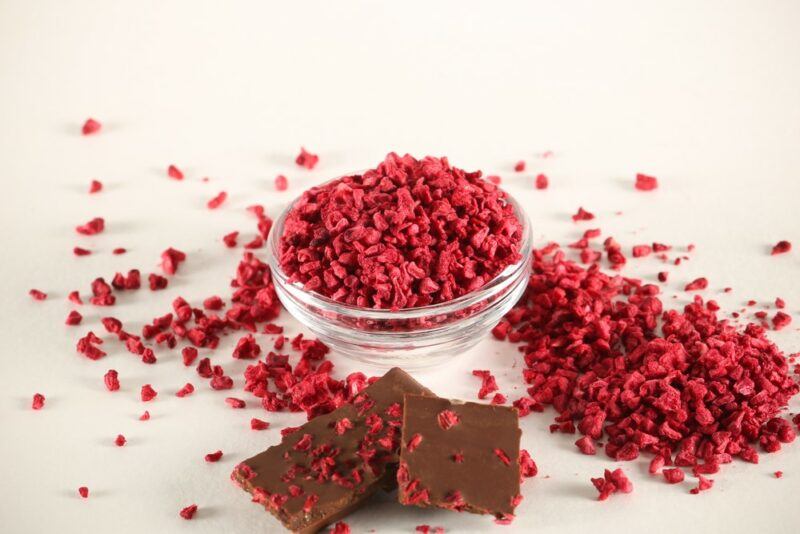
Freeze drying is an interesting process. It involves first freezing the raspberries, then removing their water through primary and secondary drying. The approach helps to preserve produce, giving it a much longer shelf life than it would have otherwise.
The ability to preserve raspberries like this is simply amazing, as the fruit doesn’t last long fresh.
Surprising as it might seem, freeze dried raspberries are still very good for you. Most of the nutrients and plant-based compounds remain intact following the freeze drying process.
In fact, the phytonutrient content could even be higher than with fresh versions. This happens because phytonutrients decrease over time. Fresh raspberries might spend a while in transport, then sitting in the store, with the phytonutrient content declining all the while. On the other hand, freeze dried raspberries are frozen soon after being harvested, making them an excellent source of those plant-based compounds.
That’s not all.
Freeze dried raspberries also have an intense flavor, more than fresh raspberries even. They’re an excellent way to add taste to baked foods and desserts. You don’t even need to use many raspberries to get a strong flavor.
There’s just one issue to remember, the fact that dehydration makes freeze dried raspberries more sugar dense too. This simply means that you need to be cautious with your portion sizes. Make sure you don’t overdo it and you’ll get plenty of benefits from freeze dried raspberries.
Are Frozen Raspberries Healthy?
Frozen raspberries are another option. They’re frozen shortly after harvesting too, but aren’t dehydrated.
Not surprisingly, frozen raspberries offer most of the benefits that you get with fresh ones – including antioxidants and fiber. They also last much longer than fresh raspberries and are available at any time of the year.
Pretty amazing, right?
Frozen raspberries are delicious too. You can even eat them straight from the freezer as a healthy summertime snack. Or, why not use them to create fantastic smoothies or desserts?
There’s one catch though. Like many other fruits, raspberries end up a bit mushy once they’ve been frozen and thawed. They don’t taste quite as good as fresh raspberries either.
As such, thawed berries are fantastic when used in recipes, but much less appealing when served on their own.
Interestingly, it’s often best to buy frozen raspberries rather than freezing your own (unless you’re freezing raspberries straight from your garden). After all, any berries that you buy from the store will have been sitting around for a while, while commercially frozen berries are frozen almost as soon as they were harvested.
Are Blueberries Better Than Raspberries?
Blueberries are often seen as the most powerful type of berry, partly because they have an exceptionally high ORAC (that stands for Oxygen Radical Absorbance Capacity). Raspberries have a much lower ORAC score.
However, ORAC scores aren’t everything. Antioxidants actually have many roles in the body and the ORAC score only captures a fraction of these.
Antioxidants aren’t the end of the story anyway. Fruit can improve your health in many other ways as well.
Raspberries are actually better than blueberries in some ways, as they contain less sugar and fewer carbs. They also contain more iron and magnesium per serving.
What About Yellow And Black Raspberries?

While red raspberries are easily the most common type, you can find other varieties too, including yellow raspberries (sometimes called golden raspberries) and black raspberries. The yellow ones tend to have a sweet and mild flavor, lacking the sharpness that you often find with red raspberries. Black raspberries, on the other hand, have a distinct sweet-tart flavor balance.
Both types have a similar nutritional profile to red raspberries. As such, they also end up being an excellent source of fiber.
There are differences in the antioxidant content though, as the pigment molecules in plants are responsible for much of the antioxidant function. Not surprisingly, then, black raspberries tend to have a higher antioxidant activity than red raspberries, while yellow ones may have fewer antioxidants.
Still, as we discussed earlier, antioxidants aren’t the whole story. The nutrients and fiber in raspberries are powerful for health too and these are present in all types of raspberries.
Final Thoughts
Raspberries might not be a famous superfruit, but they’re still delicious treats that are full of antioxidants and provide plenty of nutrients. They’re also one of the best fruits for fiber and don’t contain all that many carbs.
What’s not to love?
The most important thing is simply to watch your portion sizes (which, let’s be honest, is true for all foods). Raspberries do contain some sugar and they’re high in oxalates, so eating multiple cups of raspberries each day certainly isn’t a good idea.
This isn’t a huge problem though, as the strong flavor of raspberries means that you don’t need a large amount to enjoy them. Even just a few raspberries should be enough to bring your meal or dessert to life.
Frequently Asked Questions
Are Raspberries Acidic?
Like many fruits, raspberries are highly acidic, with a pH of between 3 and 4. This makes them a problem for anyone with acid reflux.
Do Raspberries Have Seeds?
Raspberries consist of many tiny fruits. Each of these contains juice, pulp, and a single minuscule seed. The seeds are so small that you often won’t notice them when you’re eating raspberries.
Do Blue Raspberries Exist?
While blue raspberry is a popular flavor, blue raspberries themselves aren’t a real thing. Most blue raspberry products don’t even use raspberries for flavor at all. They often just rely on other juices.
So, why create a blue raspberry flavor at all? Doing so seems to have been a way to distinguish raspberry flavored treats from cherry, strawberry, and watermelon flavored ones (which are also red).
How Long Do Raspberries Last?
Raspberries have a very short shelf life. When stored well in the fridge, you will normally get between two and three days from them. If you keep them on the counter, they only last a couple of hours.
Can You Have A Raspberry Allergy?
A raspberry allergy is indeed possible and presents with typical reactions like swelling, itching, and watery eyes. The allergy is often related to compounds called salicylates, which some people are sensitive to.
Thankfully, raspberry allergies are uncommon, so most people don’t need to worry about this.








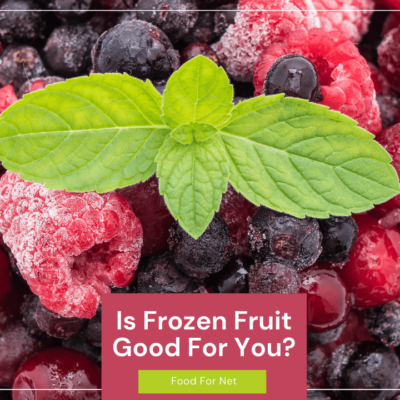








 Is Sunflower Oil Good For You?
Is Sunflower Oil Good For You?
Leave a Reply